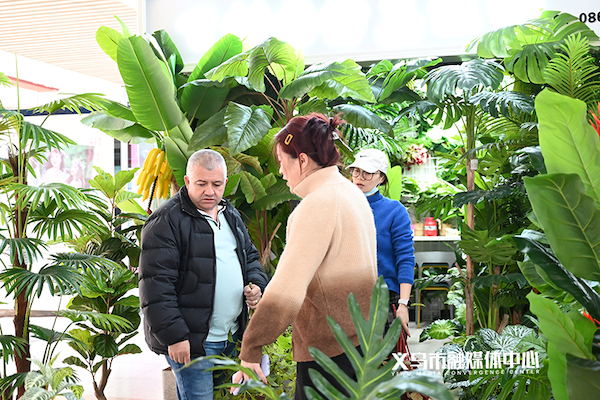US holiday shopping keeps cargoes flowing from China

File photo: Electronic Santa Claus mascots are popular at the Yiwu Small Commodities Market in Zhejiang province, especially those that can play saxophone. [Provided to China Daily]
Many more Americans are doing their holiday shopping online this year due to the pandemic — and many of those goods are being shipped from China.
The Port of Los Angeles processed a record 980,729 twenty-foot equivalent units (TEUs) in October, an increase of 27.3 percent over October 2019, the port said in a release.
"Propelled by replenishment of inventories and retailers preparing for upcoming holidays, October marked the busiest month in the Port's 114-year history," the statement said.
At the port, "shipping containers carrying Chinese imports are stacked like Legos in piles six high. Truckers jam the parking lots, waiting hours to pick up goods, which are then dispatched across the continent," was how The New York Times described the scene in early December.
"We're going through a time that truly is unprecedented," Gene Seroka, the port's executive director, told the Times. "This ordering and replenishment is bigger than anything we've seen, and now it coincides with holidays."
While November's port numbers were lower, 889,746 TEUs — they still were 22 percent higher than November 2019, according to Seroka, who delivered a virtual monthly update to California media on Tuesday.
About 20 miles south of LA, the Port of Long Beach also continued to see burgeoning cargo numbers in November with 783,523 TEUs, a 30.6 percent jump over a year ago.
"For every three and a half containers that are imported into Los Angeles from abroad, only one container leaves filled with US exports," Seroka said in the release, sounding a note of concern about the US trade deficit.
This November, China reported a record trade surplus of $75.4 billion, as exports surged more than 2 percent. Exports to the United States jumped 46 percent to nearly $52 billion, another record.
China's rising exports are occurring despite the yuan hovering near multiyear highs against the US dollar. The Chinese currency has notched six straight months of gains, its longest such run since late 2014.
China's exports were supported by overseas demand for personal protective equipment and electronics products for people working from home amid the pandemic, as well as seasonal Christmas demand, analysts at Nomura Securities said in a note.
"We believe China's export growth could remain elevated for another several months due to the worsening COVID-19 situation overseas," the note said.
Strong sales of refrigerators, toasters and microwaves to households have helped recharge Chinese manufacturing, powering demand for metals such as steel, copper and aluminum after a slump early in the year.
"Overall, China's quick economic recovery and its dominance as a source for products that Americans have turned to during the pandemic have outweighed the dampening effect of Trump's tariffs," Mary E. Lovely, a senior fellow at the Peterson Institute, told the Times.
At the LA port, the increased volume has helped the local economy and workers but also caused a backlog, with sometimes a dozen or more ships waiting in the harbor.
Seroka said Tuesday that there were 12 ships at anchor with an estimated 100,000 TEUs onboard, facing two-day processing delays.
"It is unusual to see this kind of import activity this late in the year," Seroka said. "But as we know, 2020 has been anything but normal."
Black Friday shoppers also were content to stay home this year, but it didn't mean they were being Grinches. Instead of putting on masks and contending with the hordes looking for doorbuster sales at all hours of the morning, they went online, which had been the long-term trend anyway.
Online spending on Black Friday last month jumped nearly 22 percent to hit a record $9 billion, while on Cyber Monday, three days after Thanksgiving, online sales reached $10.8 billion, the largest US online-shopping day ever, according to Adobe Analytics.
With a major snowstorm forecast for the New York metropolitan region Wednesday, nine days before Christmas, there probably will be more clicks filling up online shopping carts.
Likely adding to the Christmas-season buying is some "retail therapy" in a country where the COVID-19 outbreak has claimed more than 300,000 lives, and that includes yuletide decorations, of which China has been a regular source, so much so that President Donald Trump temporarily delayed tariffs on Christmas ornaments and tree lights last year.
A December 2017 report on ABC News said that the city of Yiwu, in East China's Zhejiang province, an inland city of 1.2 million people, produced nearly two-thirds of the Christmas decorations consumed worldwide.
Between September 2016 and August 2017, some 600 workshops and factories around the city made $3 billion worth of Christmas products, according to Hangzhou Customs.
With the coronavirus vaccine distribution underway in the US, people's spirits may get a boost, which could lead to more holiday spending.
A report from McKinsey & Co found that 37 percent of respondents said they would spend more online during the holidays this year.
Seroka, the LA port director, said Tuesday that he is working with several toy manufacturers facing last-minute delays leading up to Christmas Day, Dec 25.
"I've responded by personally reaching out to toy executives to get those gifts under the tree before Christmas," he said, adding that the port has seen an "unprecedented volume so close to the holiday. We're essentially in a triage situation."
"Everybody realized we don't need less stuff from Asia and China, we need more stuff," Jay Foreman, CEO of the toy company Basic Fun!, told the Times.
Seroka also said that crews on seagoing vessels should be given priority for coronavirus vaccines.
"It's important to prioritize the longshore workers and other folks who've worked every day to bring goods" to American families, he said.
Reuters contributed to this story.

 Yiwu and Qingtian: Global supermarket alliance spurs economic growth
Yiwu and Qingtian: Global supermarket alliance spurs economic growth Artificial flowers: Yiwu's evergreen business
Artificial flowers: Yiwu's evergreen business Yiwu Intl Trade Market reopens after Spring Festival holiday
Yiwu Intl Trade Market reopens after Spring Festival holiday